Stress Management Training Course in Singapore
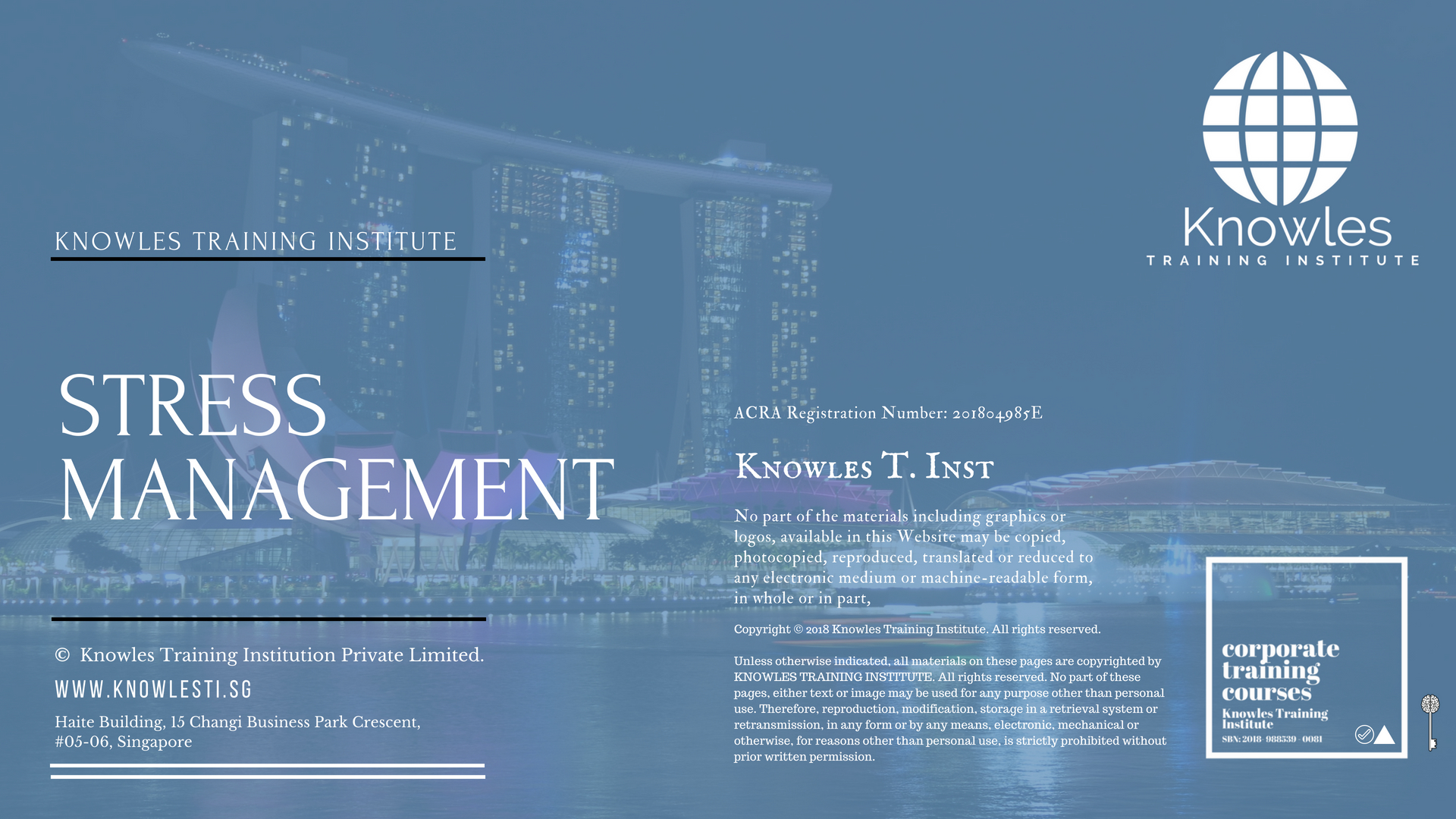
About This Stress Management Training Course
Stress Management Course in Singapore
Stress can be defined as emotional strain or state of mental tension as a result of demanding or adverse circumstances. Stress management is taking charge of your emotions, schedule, environment, thoughts, and how you deal with your problems.
Stress management includes a wide range of psychotherapies and techniques that are aimed at controlling one’s personal levels of chronic stress, with the aim of improving everyday functioning. You should note that stress produces various mental and physical symptoms that vary according to one’s situational factors. Although life throws curveballs that can become difficult to handle, stress management offers a lot of ways to maintain overall well-being and manage anxiety.
When you pursue a stress management course, you can apply different coping strategies in real-life scenarios and also implement techniques that can help you cope with stress. A good program will incorporate exercises that can reduce stress. This is because there is a relationship between exercise and the brain. When you complete the course, you should come up with your program that can help you identify stress factors that affect your life. The techniques you learn can make a real difference in your life and lead to a more productive and less stressful schedule.
Some of the information that will be covered in this stress management workshop:
- Introduction to stress awareness and the fight or flight response mechanism
- The costs and impact of stress on the organization and why it is important to tackle it
- How to recognise the symptoms and signs of stress and their long-term effects
- Review the current stress management strategies
- Your legal obligations as an employer to manage work-related stress
- How to become aware of the stressors and your physical and emotional reactions
- Responding to stressful application by using different effective techniques
- Maintaining the right level of stress
- Recognising things you can change
- How to adapt positive attitude
Who Should Attend This Stress Management Workshop
This Stress Management workshop is ideal for anyone who would like to gain a strong grasp and improve their Stress Management.
All Staff Within An Organisation
Managers
Team Leaders
Executives
Assistants
Officers
Secretaries
Group Size For This Stress Management Training Program
The ideal group size for this Stress Management course is:
Minimum: 5 Participants
Maximum: 15 Participants
Course Duration For This Stress Management Skills Course
The duration of this Stress Management workshop is 1 full day. Knowles Training Institute will also be able to contextualised this workshop according to different durations; 2 full days, 3 days, half day, 90 minutes and 60 minutes.
1 Full Day
9 a.m to 5 p.m
Stress Management Course Benefits
Below is the list of course benefits of our Stress Management course
Stress Management Course Benefits – Part 1
- Increase your overall productivity.
- Live a happier life.
- Reduce stress-related expenses.
Stress Management Course Benefits – Part 2
- Think creatively.
- Deal with self-critical comments.
- Improve your health.
- Understand how stress can impair your well-being and performance at work.
Stress Management Course Benefits – Part 3
- Know the difference between toxic and healthy stress, and how you can leverage healthy success to achieve success.
- Learn the benefits of mindfulness and how it can help you build resilience to stress, team spirit at work, and innovation.
- Know the research-based strategies for cultivating mindfulness within the organisation.
Stress Management Course Benefits – Part 4
- Understand the common models and theories of stress.
- Learn how to evaluate your stress levels and deal with it positively.
- Identify the symptoms and sources of various types of stress.
Stress Management Course Benefits – Part 5
- Know how to apply different stress management strategies that can help you to overcome stress.
- Comprehend the effects of stress that is improperly managed on an individual, family, and its impact on productivity.
- Design solutions to one’s response patterns to stress that make it more compatible with your personal goals.
- Acquire the critical skills of a good manager of stress and come up with an action plan that addresses stress issues at the work place.
- Recognise the issues involved in managing stress at the workplace.
Stress Management Course Objectives
Below is the list of course objectives of our Stress Management course
Stress Management Course Objectives – Part 2
- Define stress.
- Define eustress.
Stress Management Course Objectives – Part 3
- Recognise the most suitable strategy to a stressful situation, Alter, Avoid, or Accept.
- Explain what lifestyle elements one can change to overcome stress.
Stress Management Course Objectives – Part 4
- Exercise routines to conquer stress.
- Apply environmental and physical relaxation methods.
Stress Management Course Objectives – Part 5
- Learn to better cope with significant events.
- Apply a stress log to recognise stressors and build a plan to reduce or eliminate stress completely.
Course Content For This Stress Management Training Course
Below is the list of course content of our Stress Management training course
Stress Management Course – Part 1 : Understanding Stress
- Define Stress
- Define Eustress
- Explain The Triple “A” Approach
Stress Management Course – Part 2: Creating A Stress-Free Lifestyle
- Stress Free Diet
- Stress & Exercising
- The Relationship Between Stress & Sleep
Stress Management Course – Part 3: Altering The Situation
- The First A of The Triple A Approach
- Altering: Identifying The Appropriate Situations
- Altering; Creating Effective Actions
Stress Management Course – Part 4: Avoiding The Situation The Correct Way
- The Second A of The Triple A Approach
- Avoiding: Identifying The Appropriate Situations
- Avoiding: Creating Effective Actions
Stress Management Course – Part 5: Accepting The Situation
- The Third A of The Triple A Approach
- Accepting: Identifying The Appropriate Situations
- Accepting: Creating Effective Actions
Stress Management Course – Part 6: Using Routines To Reduce Stress
- Planning Meals
- Organising Chores
- Using a To-Do List
Stress Management Course – Part 7: Environmental Relaxation Methods
- Find a Sanctuary
- Using Music
- Trying To See The Humor
Stress Management Course – Part 8: Physical Relaxation Methods
- Soothing Stretches
- Deep Breathing Exercises
- Tensing & Relaxing
- Meditation Effectively
Stress Management Course – Part 9: Coping With Major Stressful Events
- Establishing a Support System
- Creating a Plan
- Knowing When to Seek Help
Stress Management Course – Part 10: Challenging Yourself To Change
- Creating Your Stress Log
- Recoding Events
- Identifying Stressors & Creating Your Plan
- Creating New Habits
- Reviewing & Evaluating
Stress Management Classes Value Added Materials
Each participant will receive the following materials for the Stress Management course
Stress Management Learner’s Guide
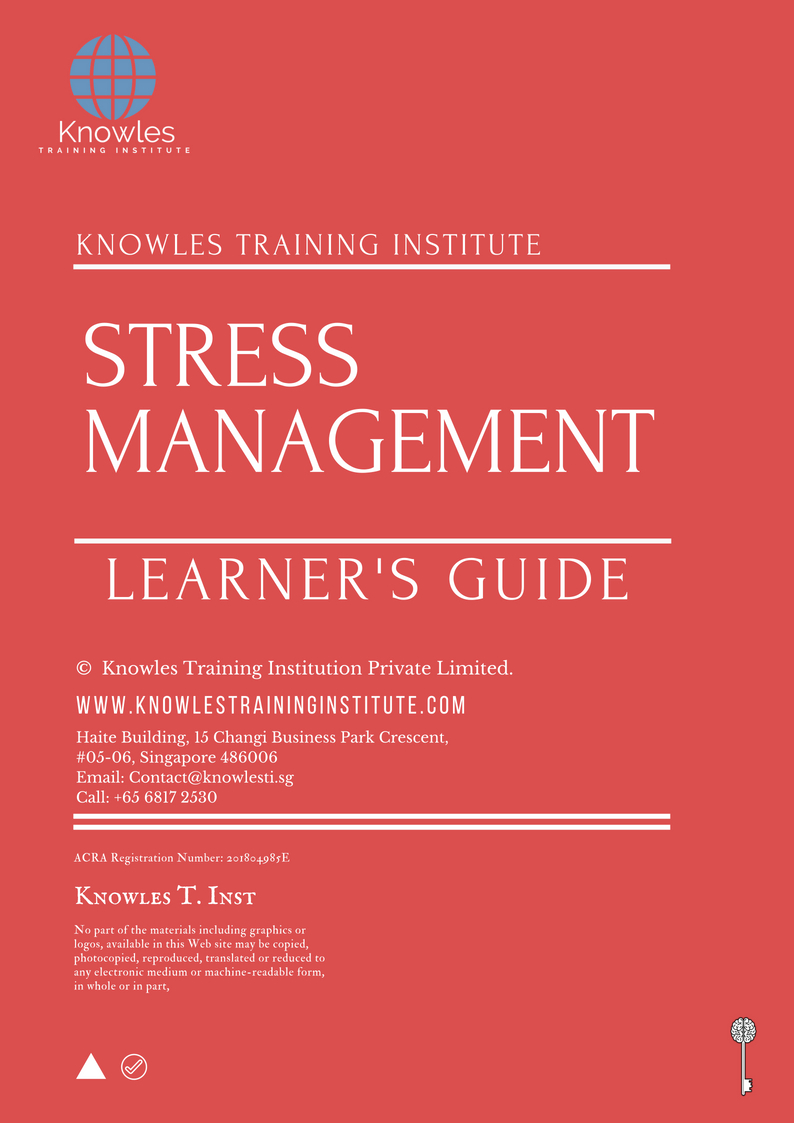
Stress Management Key Takeaways Notes
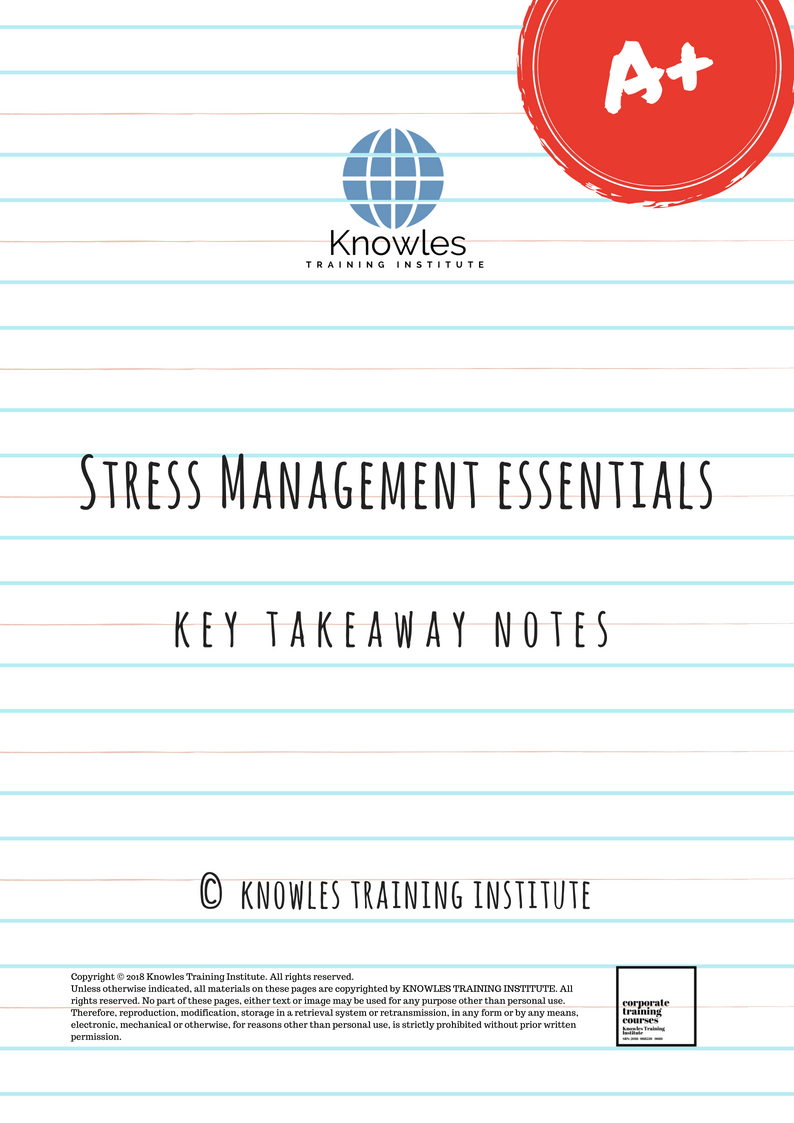
Stress Management Essentials Ebook
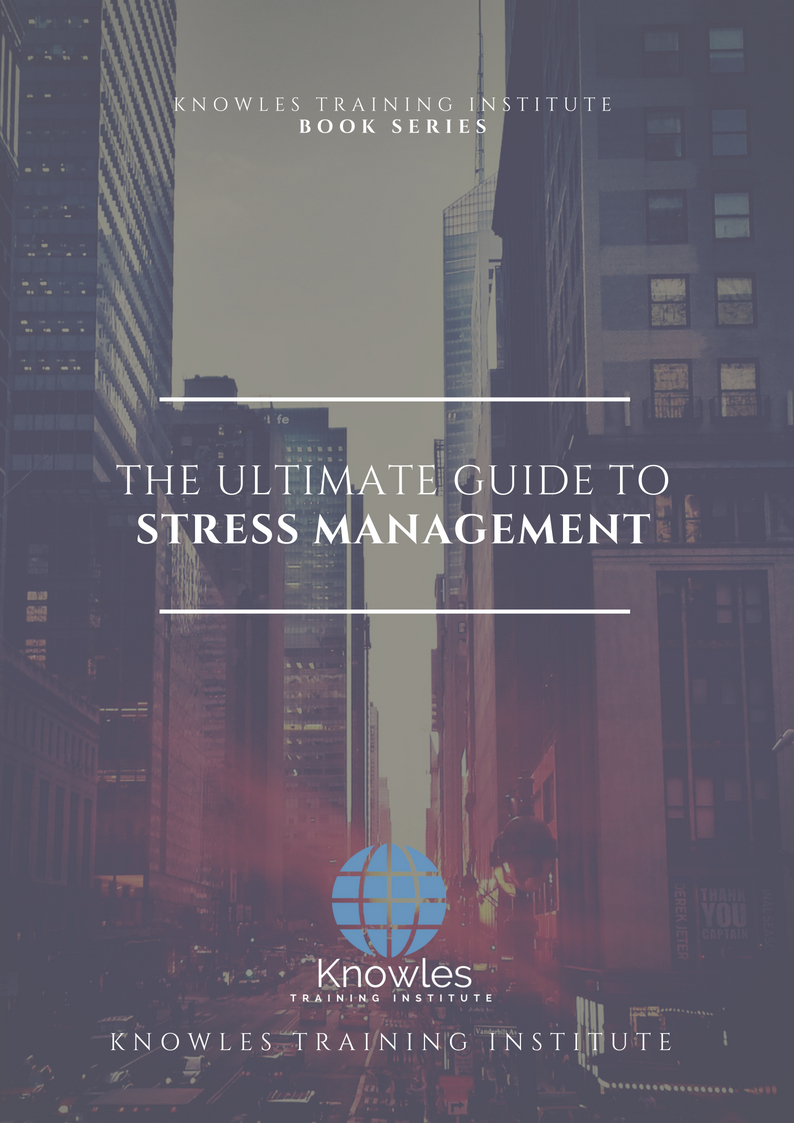
Stress Management Course Handouts
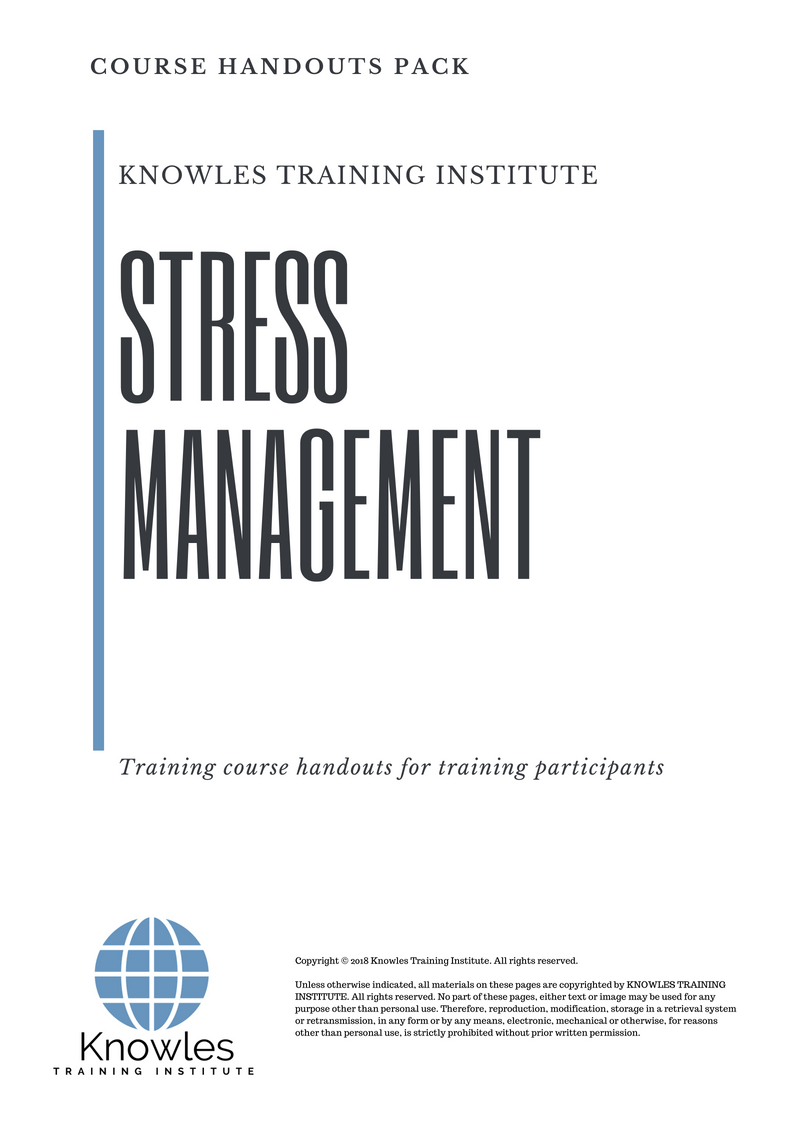
Stress Management 30-Day Action Plan
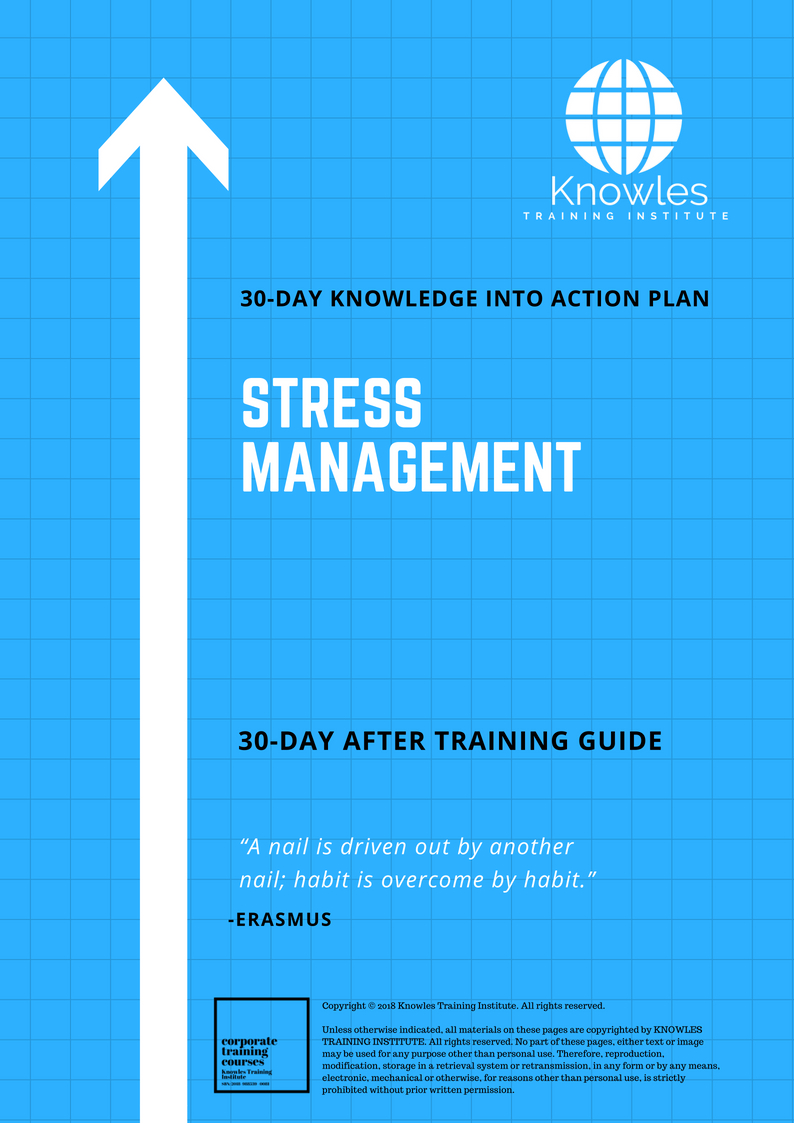
Stress Management MindMaps Pack
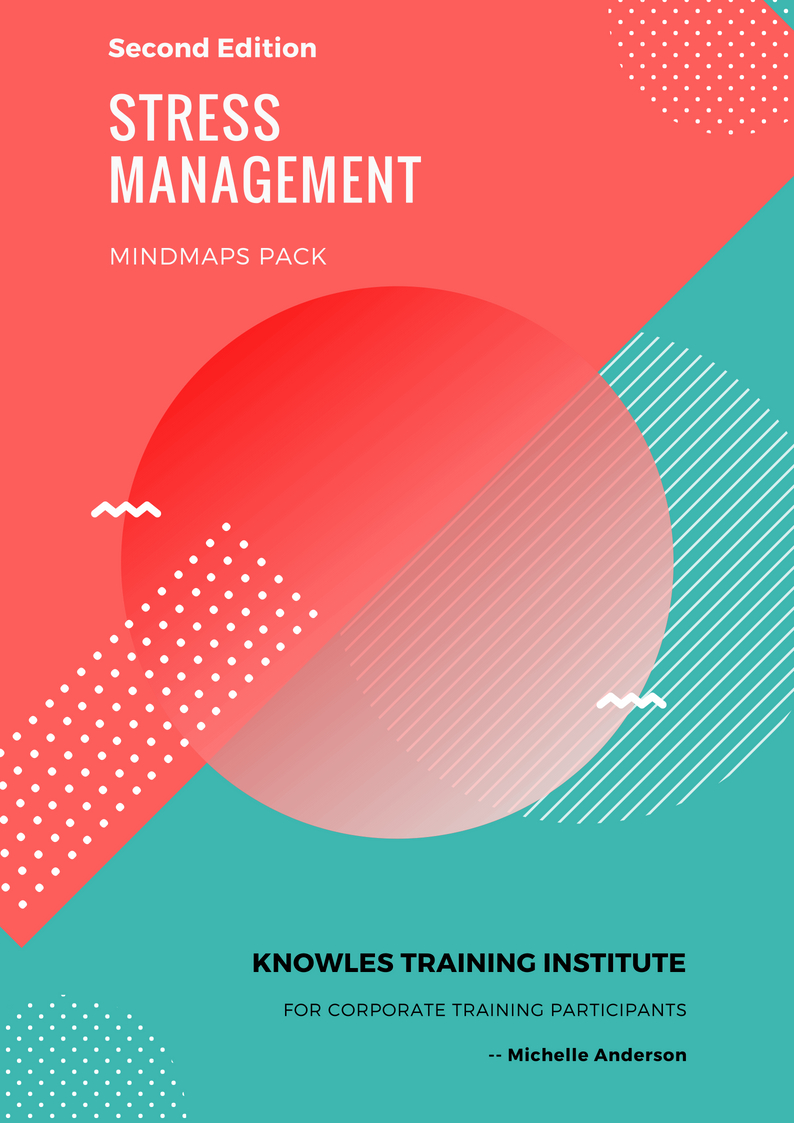
Stress Management PPT Slides Used During Course
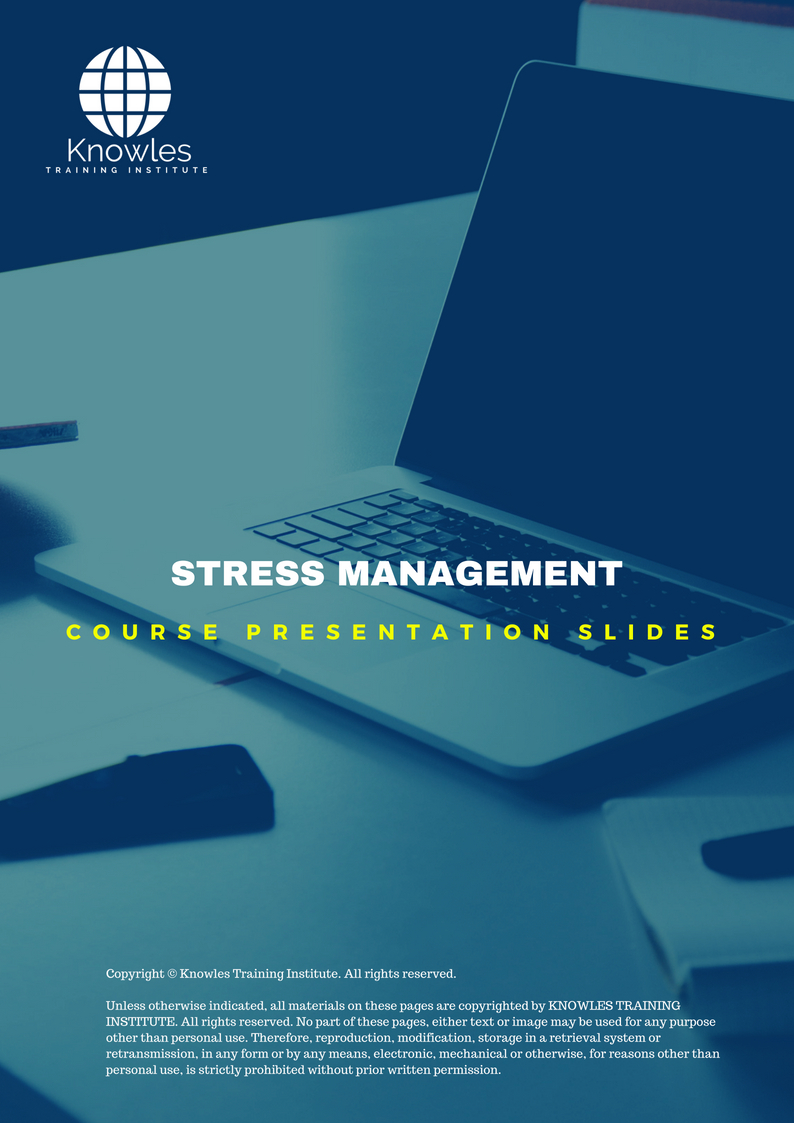
Stress Management Long-Term Memory Flashcards Pack
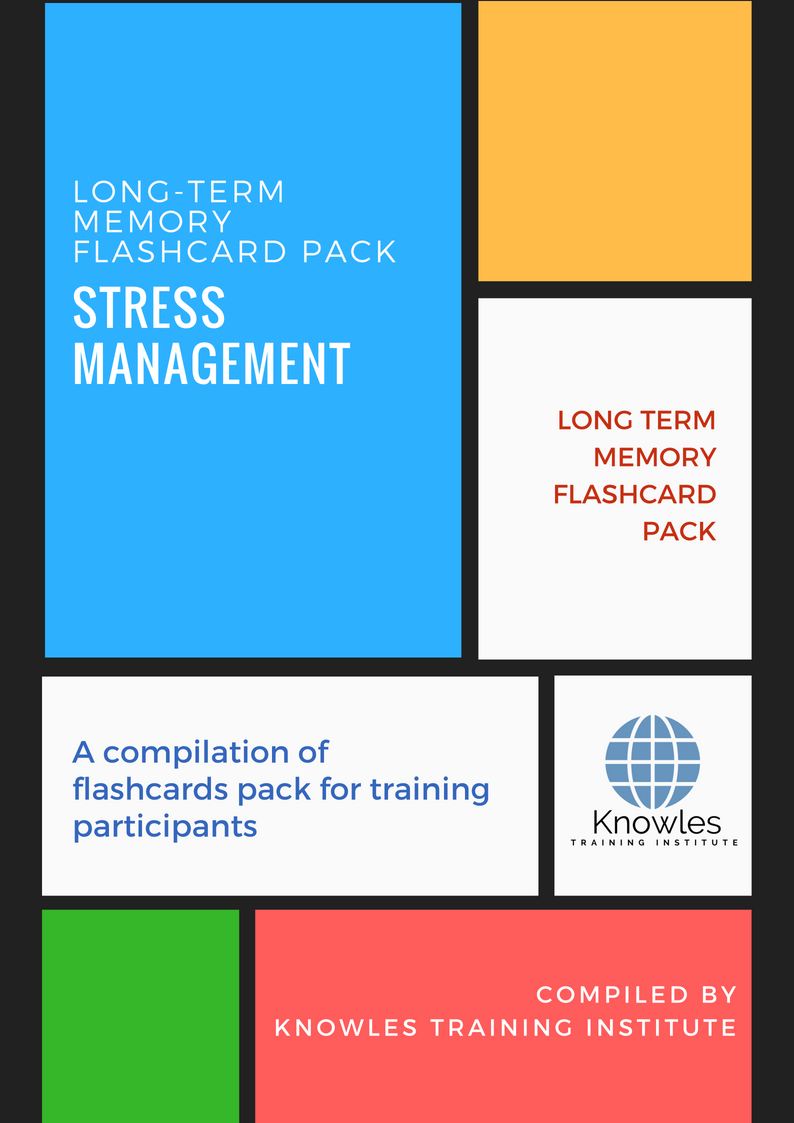
Stress Management E-Learning Course
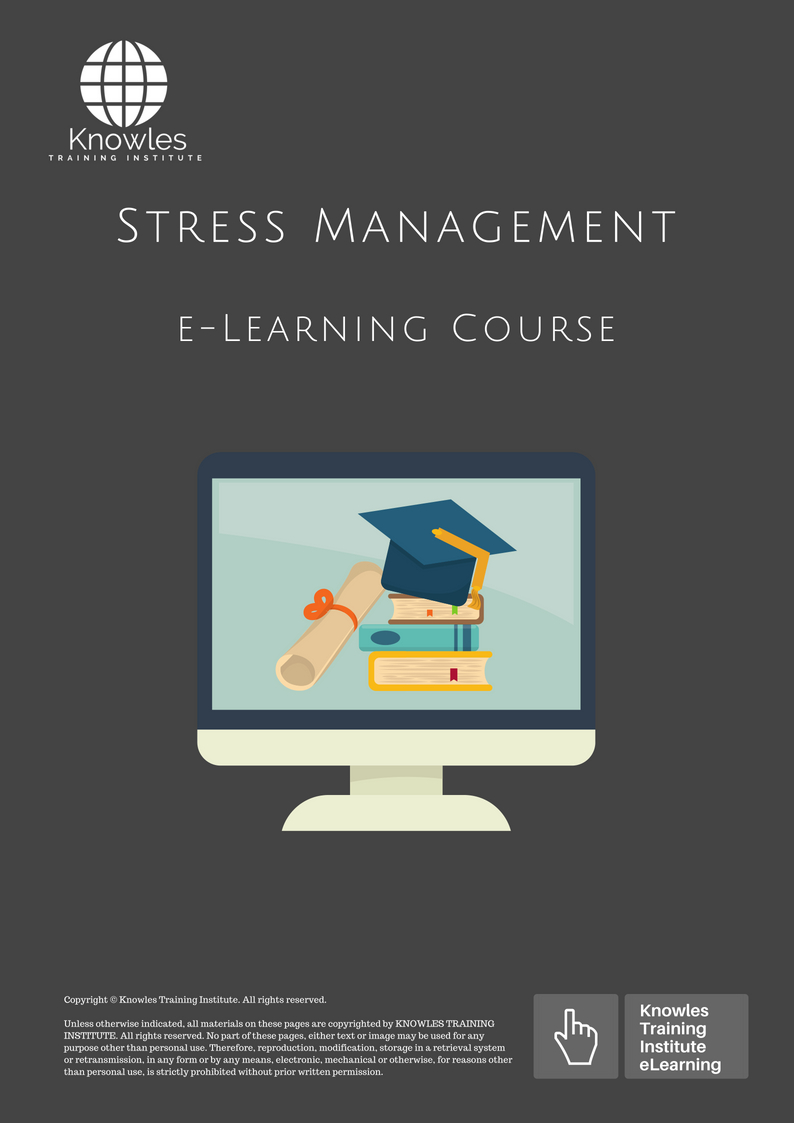
Stress Management Online Video Course
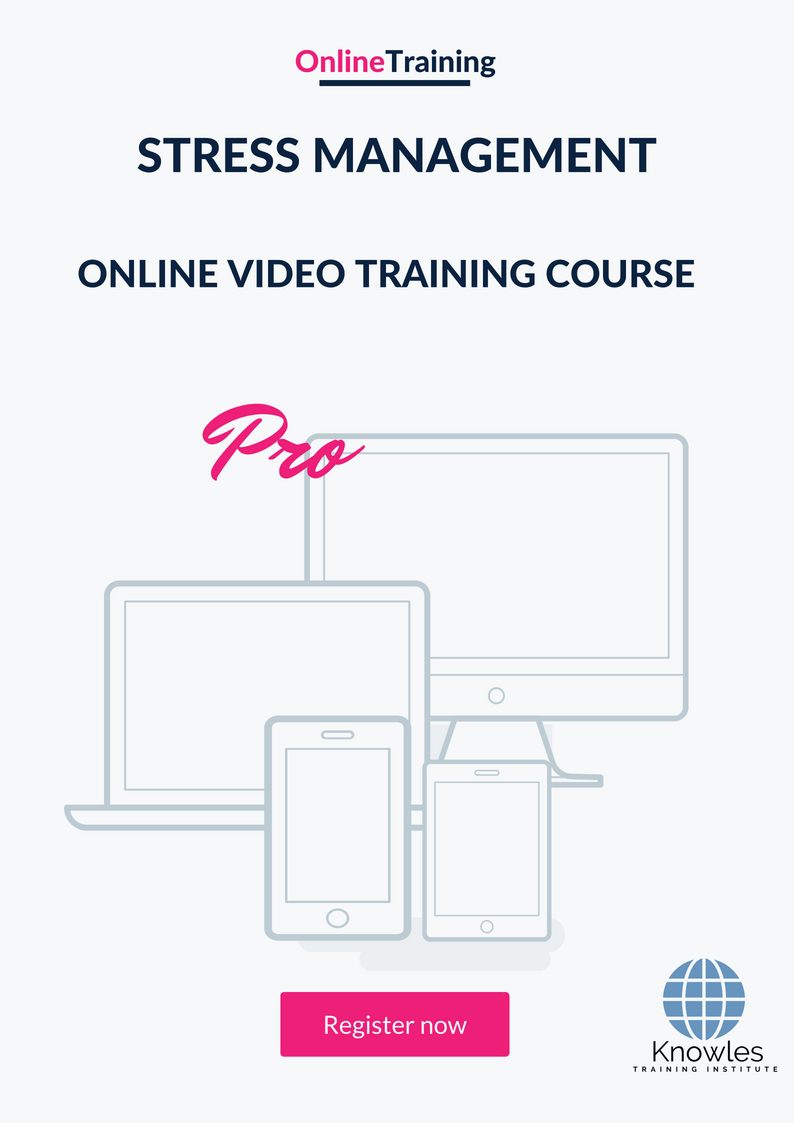
Stress Management Essentials Audiobook
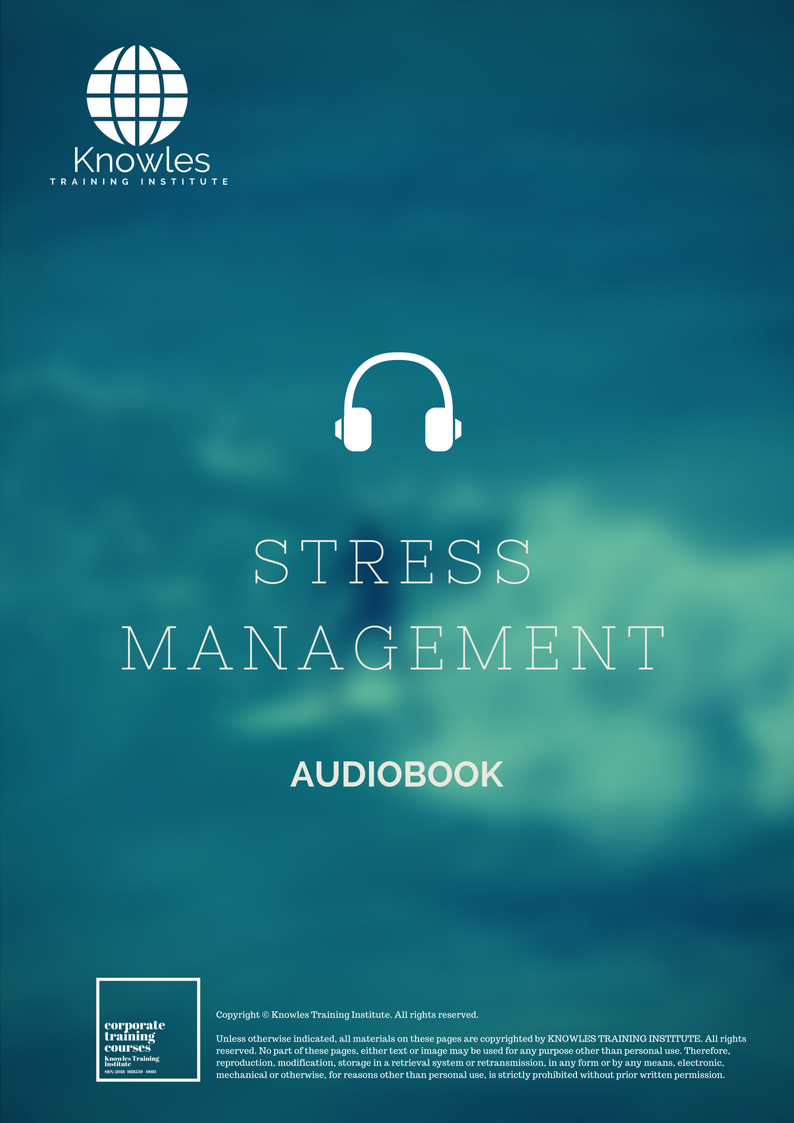
Stress Management Infographics Pack
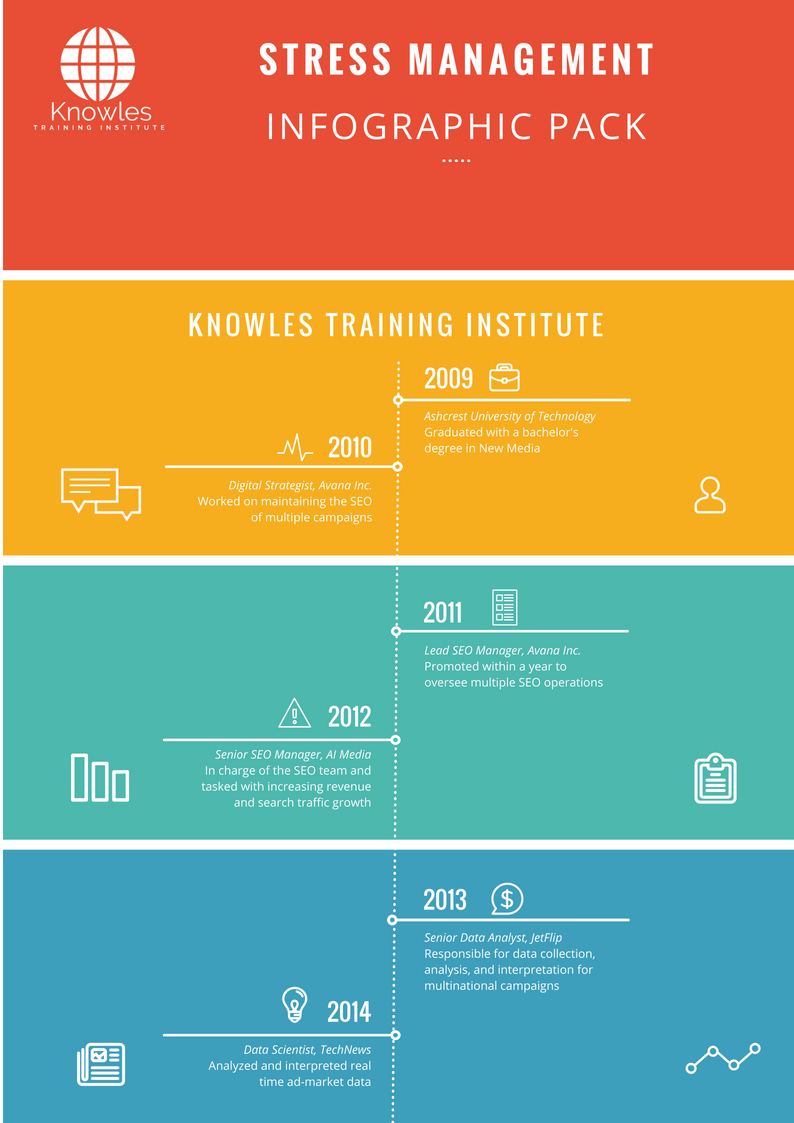
Stress Management Certification
Each course participant will receive a certification of training completion
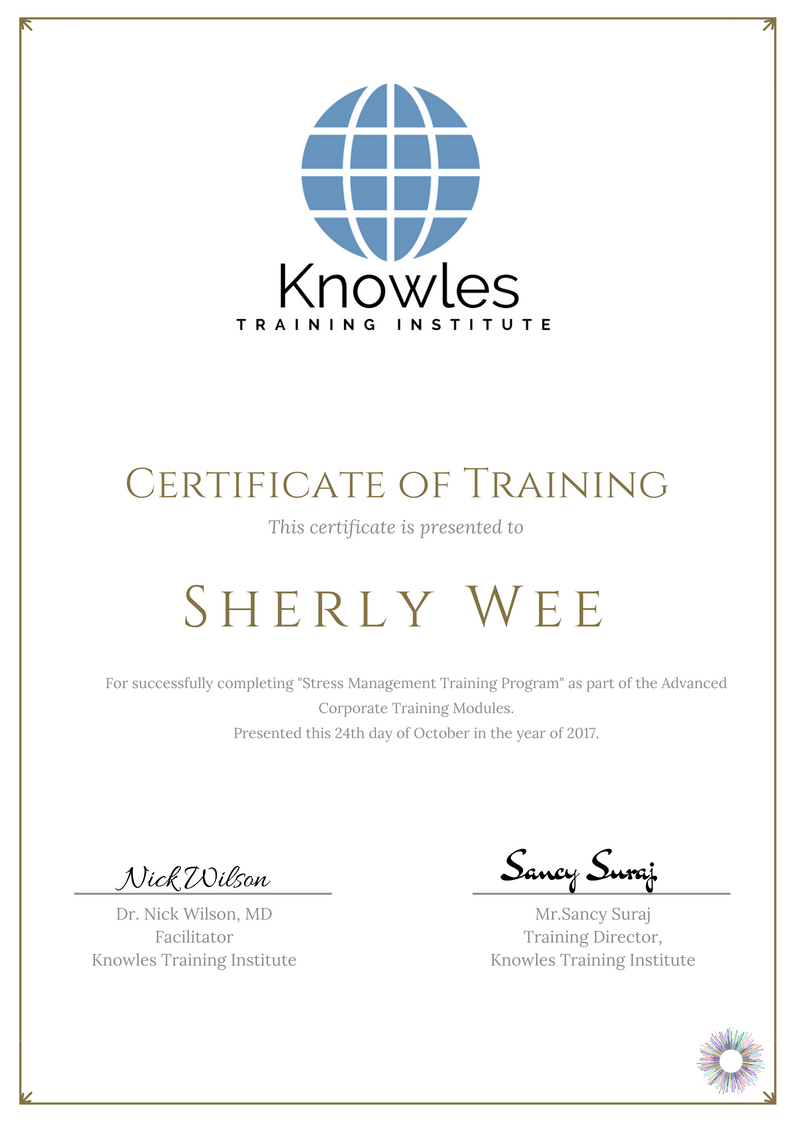
Course Fees
There are 2 pricing options available for this Stress Management training Classes. Course participants not in Singapore may choose to sign up for our online Stress Management training course.
Premium 2-Full Day Course
- Learner’s Guide
- Course Handouts
- PPT Slides Used During Training Course
- Long-Term Memory Flashcards Guide TM
- 1 Year Access to Online Training Video Course (*Worth S$589.97)
- Contact Your Trainer: 90-Day Post Course Help (*Worth S$89.97)
- Key Learning Takeaway Notes (*Worth S$18.97)
- Audio Book (*Worth S$18.97)
- eBook (*Worth S$14.97)
- Course Infographics Pack (*Worth S$11.97)
- Course Mind Maps (*Worth S$8.97)
- 30-Day Action Plan
Upcoming Stress Management Training Course Schedule
Contact us for the latest Stress Management course schedules:
Phone: +65 6714 6663
Email: contact@knowlesti.com
Message:
Post-Training Support: A vast majority of training does not have any effect beyond 120 days. But to work, training has to have a strong pre- and post-training component. Post-training reinforcement consequently helps individuals to recall the understanding and ask questions.
Blended Learning: Learning does not occur in the classroom. Virtually everybody prefers distinct ways of learning. Successful learning should have a multi-channel, multi-modal strategy.
We Understand The Industry: Similarly, we’ve got a profound comprehension of the business, business design, challenges, strategy and the that our participants are in and have designed the courseware to cater to their professional needs.
Course Content: Knowles Training Institute’s material is relevant, of high quality and provide specific learning outputs. As a result, Participants will leave the training course feeling as they have gained a strong understanding and will also be in a position to execute what they have learned sensibly.
Course Development — The workshop modules follow a systematic and logical arrangement. Therefore, this structure helps to ensure that the course material allows the facilitators to deliver the course in a logical arrangement. Consider the subjects as building bricks into learning, our facilitators slowly build towards a comprehensive picture of this entire topic.


Course Enquiries

Fill up the form and we will get back to you in less than 1 working day.
Alternatively, give us a call to have one of our training consultants contact you. Our corporate training courses can be contextualized to meet your organization’s training needs. Leverage on our large pool of professional trainers and consultants for your organization’s training needs.
Office Address: 60 Paya Lebar Rd, #07-54 Paya Lebar Square, Singapore 409051
Office Phone: +65 6714 6663
Email: contact@knowlesti.sg
We Guarantee 100% Privacy. We Respect Your Privacy. Your Information Will Never Be Shared.
Questions
Some of the signs that you are stressed out include:
- Depression or anxiety.
- Anger, irritability, or restlessness.
- Feeling overwhelmed, unmotivated, or unfocused.
- Trouble sleeping or sleeping too much.
- Racing thoughts or constant worry.
- Problems with your memory or concentration.
- Making bad decisions.
First, you can start off with finding out the source of your stress.
Second, list these stressors in order of their impact.
Which affects your health and well-being most?
Which affects your work and productivity?
Third, you can consider using some of the approaches to manage your stress. You will most likely have to use different types of approach.
Stress is a natural reaction to dealing with challenges every day. Usually, stress can help everyone perform great under pressure, but continuous stress can create problems for our health.
Stress causes the release of cortisol, the stress hormone, alongside adrenaline, which influences our blood pressure, heart rate, eating habits, our ability to fight-off illness and more. Long term stress can also increase our risk of heart attack or stroke and contribute to depression.
When you are stressed, the one thing you probably not feel like doing is getting up and exercising.
However, doing physical activities is a great way to destress, and you do not have to spend hours in a gym to gain benefits.
Exercise releases endorphins that will help make you feel good, and it can also serve as a great distraction from your worries.
Just exercising for 30 minutes will help you gain benefits.
Minimal activities can even add up over a day. What you have to do is to get yourself up and move.
During stress, the brain will release hormones that would affect the respiratory and cardiovascular systems.
These hormones narrow the blood vessels, which will lead to shallow breathing. These responses can ultimately lead to dizziness.
Usually, people are be able to identify the cause of their dizziness. However, this symptom may occur unexpectedly or without any clear reason.
The causes of dizziness can range from temporary physical changes to more serious underlying medical conditions.
Six ways to not stress about the things you cannot control:
- Learn what you can control.
- Identify your fears.
- Concentrate on your influence.
- Differentiate between ruminating and problem-solving.
- Create a stress management plan.
- Develop healthy affirmations.
5 Stress Management Techniques
- Take a 10 minute walk. According to a several experts if you take a walk it will help reduce endorphins in the system that cause stress
- Practice mindfulness. Learning to focus on your breathing can help you reduce stress
- Create an exercise regiment
- Write a reflection journal
- Organize yourself
There are three stages of stress:
- When entering the alarm stage, your brain sends a signal to other parts of your body, which informs that you’re in an alarming situation.
- Second is the resistance stage. It releases a low amount of cortisol, and your heart rate begins to normalize. Although your body enters this recovery phase, it remains on high alert for a while.
- The exhaustion stage is the consequence of prolonged or chronic stress. You might give up or feel your situation is hopeless.
We all have stress. Whether it is at work, at home, or outside these two bubbles, more often than not, we can feel stressed because of a bad interaction, too much work, or everyday hassles.
Here are three ways we can combat stress:
- Talk to Someone
- Take Control
- Try Relaxation Techniques
Stress is your brain and body’s response to a perceived threat. Sometimes, the right amount of stress is good for you and drives you to take action. However, stress can suppress your immune system and cause you to get sick. Stress can cause illnesses.
Usually, symptoms can come on as soon as your level of stress rises and worsen as pressure stretches. These symptoms can go away once your stress level decreases.
Stress can be caused by different physical or emotional stimuli or situations.
People speak of different types of stress, such as work, relationship, or parenting stress. Children can also be affected by stress.
Despite its source, and stress can become unmanageable or overwhelming.
Stress often affects emotions first, which can cause psychological symptoms.
Emotional stress means the occurrence of adverse effects, such as anxiety, in the setting of a physiological stress response that combines cardiovascular and hormonal changes. Emotional stress generally transpires when an individual sees that he or she does not have sufficient personal support to meet situational requirements efficiently.
When continuous stress happens, our body makes a higher amount of cortisol.
Cortisol and stress can lead to difficulties. High levels of cortisol can decrease the brain’s capability to operate correctly. According to many studies, continued stress will impair the way our brain functions in various ways. Such stress can kill brain class, and it can even reduce the size of our brain. It has a shrinking effect on our prefrontal cortex, the area of the brain that is responsible for memory and learning.
5 (Five) Signs Of Emotional Suffering:
- Personality Changes – sudden or gradual changes in the way someone behaves that doesn’t fit their values.
- Uncharacteristically Moody Or Agitated – more frequent problems with controlling one’s temper
- Withdrawal Or Isolation – Pulling away from family and friends.
- Neglecting Self-Care – a change in the person’s level of personal care or an act of poor judgement
- Overwhelmed With Hopelessness – Prolonged grief or feelings of worthlessness
Not all stress is harmful. Some stress sharpens your senses, assisting you to evade accidents, power through unforeseen deadlines, or stay clear-minded in uncontrolled situations. It the “fight-or-flight” response that your body triggers in the events of pressure.
Types of stress:
- Acute Stress
- Episodic Acute Stress
- Chronic Stress
8 (Eight) Natural Ways To Reduce Stress Hormones:
- Sleep right
- Have a go-to relaxation techniques
- Exercise the right way
- Use adaptogens
- Focus on eating hormone-balancing foods
- Practice mental health


